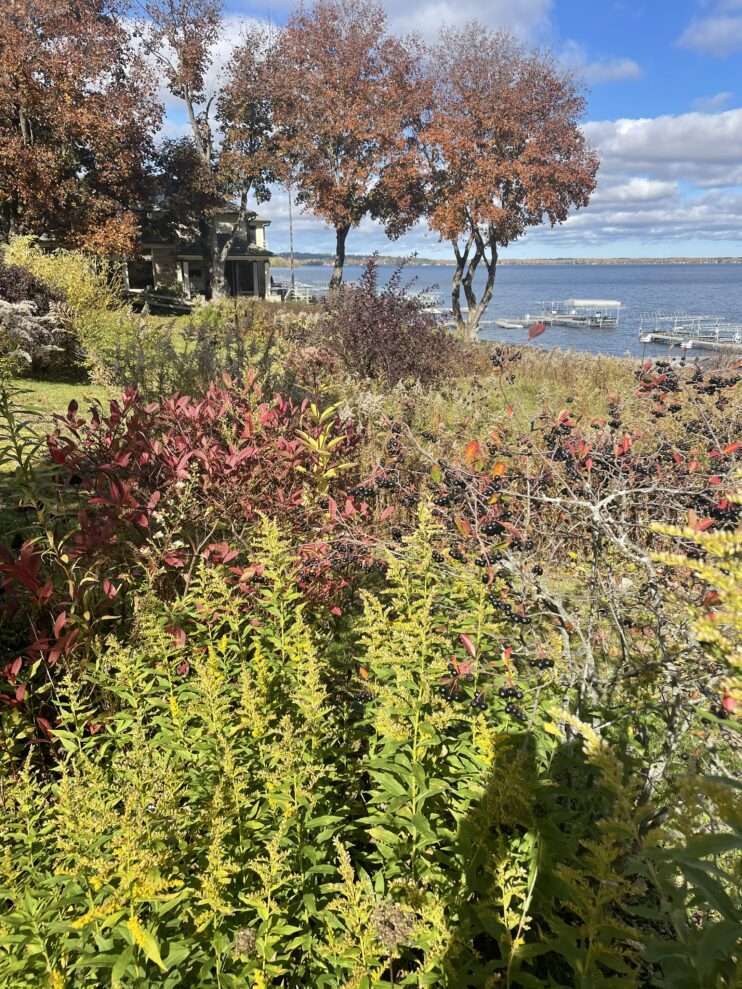
Chautauqua Lake rain garden
Blogger Beth Ginter
October 26th 2023
This week, I traveled to western New York, in the fine company of my husband and dogs, where Dave Hirschman and I led a workshop, “Sustainable Landscaping in Our Watershed,” for the Chautauqua Watershed Conservancy (CWC). I don’t often travel such long distances for work events due mainly to the fact that we are focused extensively on our own Chesapeake Bay region work, but it is refreshing to have a change of scenery and learn about other watersheds and the challenges they face. I accepted this invitation in the spirit of a “pay it forward” journey, an opportunity to share some of the learnings from eight years of working on the CBLP program, with others. Too often, I take for granted the wealth of knowledge and resources about environmental protection and sustainable stormwater management that we are fortunate to have here in the mid-Atlantic. The CWC understands the unique role that landscape professionals play in conservation and reducing the negative impacts of stormwater, and they are eager to train these professionals to work with homeowners and local municipalities to help meet water quality and habitat restoration goals.
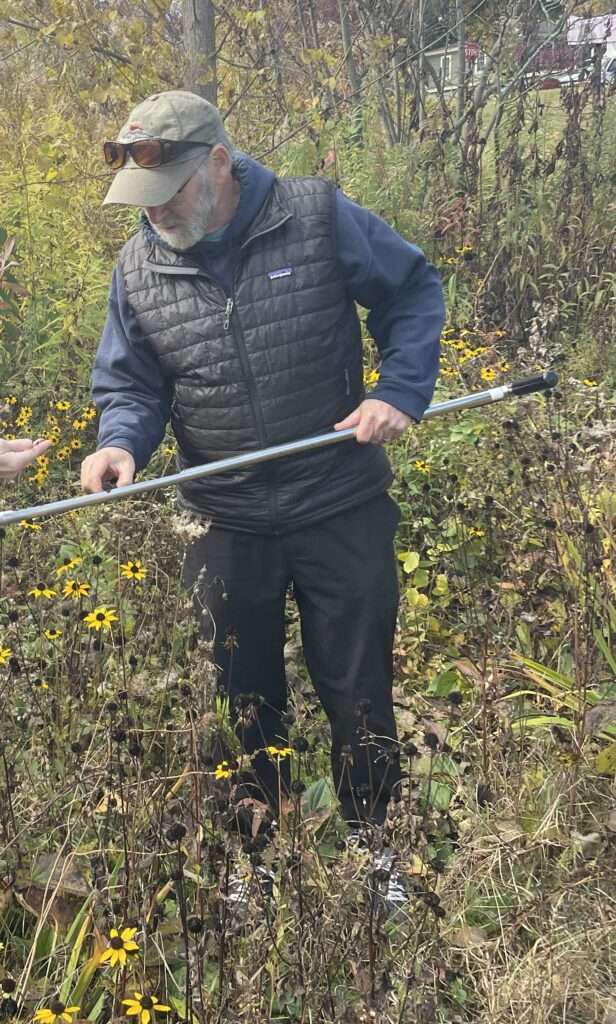
Dave inspecting rain garden soil in NY
More than 300 miles from home, on the shores of Chautauqua Lake, a glacial lake with a watershed of 180 square miles, this journey brought me to thinking about CCLC’s roots and I was again reminded that we live in a small world. Our connection to CWC came through Carol Markham, a former Marylander, who now lives and works for CWC in beautiful, rural Chautauqua County. I didn’t know until we arrived that Carol previously lived in Annapolis where she worked for the US Fish and Wildlife Service (FWS), with one of CCLC’s founding mothers and the first winner of CCLC’s Marcy Damon Conservation Landscaping award, Britt Slattery. While in Annapolis, Carol contributed to the development of the FWS native plant guide for the Chesapeake region which is one of CBLP’s key resources for Level 1. Small world, right?
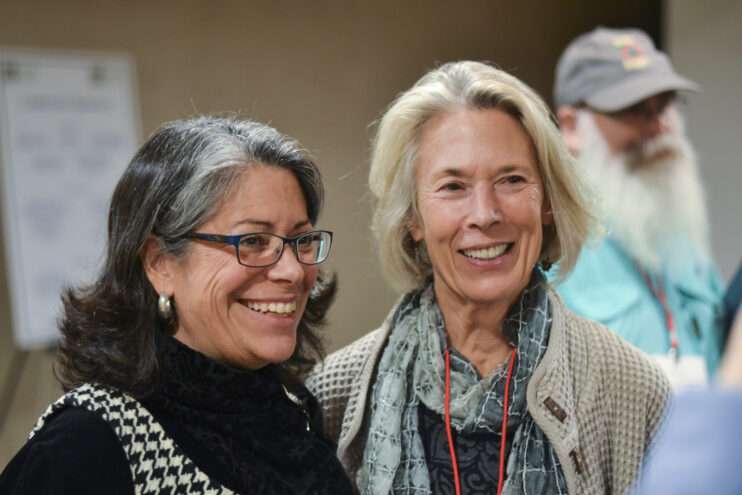
Britt and Ellie at TaNL 2015
Working with Carol and the CWC team this week led me to reflect on CCLC’s founding and how the kernel of an idea formed twenty years ago developed into the impactful organization I lead today. When I was in graduate school in the mid 2000s, CCLC was ramping up its outreach efforts, growing the biennial Turning a New Leaf conference into our region’s preeminent sustainable landscaping conference. I was so excited to learn that there was an organization devoted to the work I had changed careers to pursue. Turning a New Leaf was my introduction to CCLC; providing a welcome opportunity to gather with like-minded pros, learn from experts, and build my network. Although we are better known today for the CBLP program, CCLC was, in those days, synonymous with Turning a New Leaf, and, thus, for me, attending the conference always feels a bit like coming home.
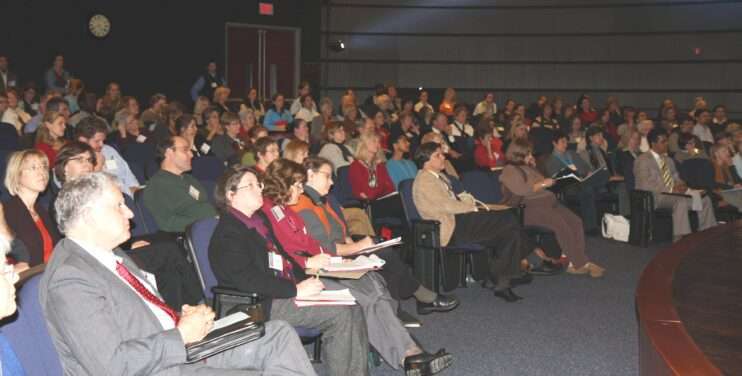
Audience at the 2009 TaNL at GWU
This year, our conference theme is “Creating Resilient Landscapes and Communities” and we’ve assembled an outstanding line up of speakers for the December 7 conference, including presentations by Black horticulture historian, Abra Lee, and pollinator conservationist, Heather Holm. Concurrent sessions in three tracks: Resilient Landscapes, Resilient Communities, Resilient Plants and Soils will include a wide range of topics from plant selection and landscape design through a cultural heritage lens, to urban forestry and carbon capture in grasslands. Bay nature photographer, Jay Fleming, will offer his books for sale during the conference lunch. Come a day early and join us as Dave Hirschman leads a special short session for CBLP certified pros, “Stormwater for Poets and Philosophers” and stay to enjoy cocktails and a welcome dinner, featuring Joel Dunn, the CEO of Chesapeake Conservancy, and the presentation of the 2023 Marcy Damon award. On Friday, we’re planning two local tour options to get you outdoors: one focuses on living shorelines and one is a BMP sampler tour.
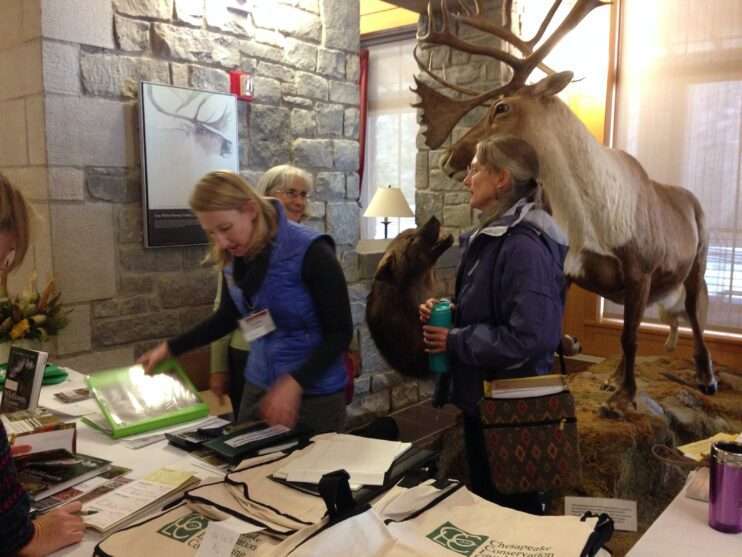
Board members at TANL 2013
Please join us as we celebrate our 10th Turning a New Leaf conference and our 20th anniversary on the shores of the Chesapeake Bay this December 6th – 8th. Learn, experience, and join the community making an impact today and for the future.
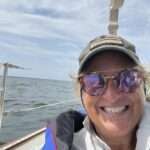
Beth Ginter is the first Executive Director of the Chesapeake Conservation Landscaping Council. Additionally, she oversees the Chesapeake Bay Landscape Professional (CBLP) program, a certification effort which provides consistent training and practice standards for landscape professionals working in the Chesapeake Bay region, Ms. Ginter has a Masters degree in Sustainable Landscape Design from The George Washington University. Her limited free time is spent with her family, walking her two corgis, and catching up on her reading.


